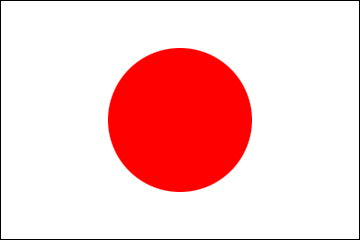Handover Ceremony of GGP/KUSANONE: “The Project for the Provision of Medical Equipment and Improvement in Accessibility at APSA Diabetes Care Centre”
2024/12/16
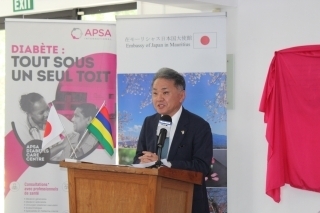 Address by Ambassador KAN
Address by Ambassador KAN
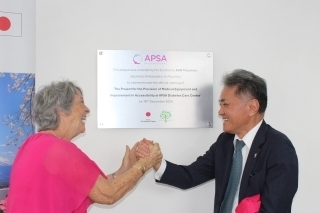 Ambassador KAN and Mrs Hardy after unveiling of commemorative plaque
Ambassador KAN and Mrs Hardy after unveiling of commemorative plaque
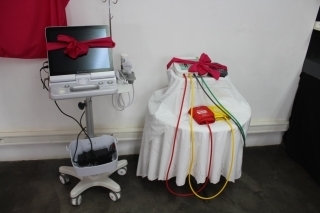 Donated medical equipment - ultrasound machine and ABPI machine
Donated medical equipment - ultrasound machine and ABPI machine
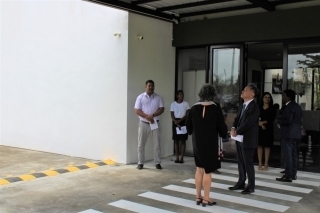 Newly introduced drop-off zone
Newly introduced drop-off zone
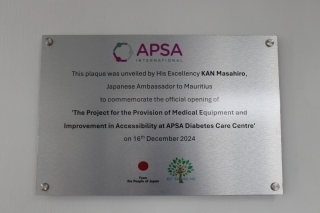 Commemorative plaque
Commemorative plaque
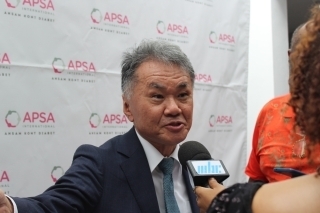 Interview with Ambassador KAN
Interview with Ambassador KAN
On 16th December 2024, the handover ceremony for the Grant Assistance for Grassroots Human Security Projects (GGP) was held in Trianon, in the presence of H.E. KAN Masahiro, Ambassador Extraordinary and Plenipotentiary, Mrs. Audrey Hardy, President of the Association pour la Promotion de la Sante (APSA International), as well as other relevant stakeholders.
According to a survey conducted in 2021, Mauritius has one of the highest prevalence of diabetes in the world with the a statistic of 20% in the population aged 25-74 years, and besides, pre-diabetes was 16%. Diabetes mellitus can cause a variety of complications and, in some cases, it can lead to lower limb amputation without early and appropriate treatment. There are approximately 450 cases of lower limb amputation per year, of which 85% can be preventable.
Founded in 1988, APSA International provides medical and educational services to type 2 diabetes patients at the APSA Diabetes Care Centre in Trianon and its branch in Black River. The NGO’s initiatives include consultations, treatments, foot care, neuro-rehabilitation programmes, nutrition workshops, educational group sessions and community visits by the Foot Care Caravan. This is the third project with APSA International, following on from two previous projects in 2009 and 2012, including one for the construction of the centre in Trianon.
Under the “The Project for the Provision of Medical Equipment and Improvement in Accessibility at APSA Diabetes Care Centre”, the NGO received a grant of 57,741 euros, or approximately 2.6 million rupees, to equip the centre with :
The APSA International is now able to conduct more efficient and accurate screening with maximum approximately 480 examinations per year using ultrasound machine and maximum approximately 1,200 examinations per year using ABPI machines. In addition, the drop-off zone will facilitate access to the centre for around 12,000 patients a year in total, including the elderly, people undergoing foot treatment and people in wheelchairs. The implementation of the project is expected to contribute to the early detection of diabetes mellitus and its complications and improve public health.
Coverage by the Mauritius Broadcast Cooperation(’28:40 - ’31:15):
https://mbcradio.tv/article/le-journal-t%C3%A9l%C3%A9vis%C3%A9-d%C3%A9cembre-16-2024
According to a survey conducted in 2021, Mauritius has one of the highest prevalence of diabetes in the world with the a statistic of 20% in the population aged 25-74 years, and besides, pre-diabetes was 16%. Diabetes mellitus can cause a variety of complications and, in some cases, it can lead to lower limb amputation without early and appropriate treatment. There are approximately 450 cases of lower limb amputation per year, of which 85% can be preventable.
Founded in 1988, APSA International provides medical and educational services to type 2 diabetes patients at the APSA Diabetes Care Centre in Trianon and its branch in Black River. The NGO’s initiatives include consultations, treatments, foot care, neuro-rehabilitation programmes, nutrition workshops, educational group sessions and community visits by the Foot Care Caravan. This is the third project with APSA International, following on from two previous projects in 2009 and 2012, including one for the construction of the centre in Trianon.
Under the “The Project for the Provision of Medical Equipment and Improvement in Accessibility at APSA Diabetes Care Centre”, the NGO received a grant of 57,741 euros, or approximately 2.6 million rupees, to equip the centre with :
- One ultrasound machine: mainly for early detection of cardiovascular complications and assessment of microvascular complications
- Two Ankle Brachial Pressure Index (ABPI) machines: mainly for rapid detection of peripheral arterial disease
- Drop-off zone: to ensure that all the patients, particularly those requiring foot care, have safe access to the centre through a protected and covered drop-off zone
The APSA International is now able to conduct more efficient and accurate screening with maximum approximately 480 examinations per year using ultrasound machine and maximum approximately 1,200 examinations per year using ABPI machines. In addition, the drop-off zone will facilitate access to the centre for around 12,000 patients a year in total, including the elderly, people undergoing foot treatment and people in wheelchairs. The implementation of the project is expected to contribute to the early detection of diabetes mellitus and its complications and improve public health.
Coverage by the Mauritius Broadcast Cooperation(’28:40 - ’31:15):
https://mbcradio.tv/article/le-journal-t%C3%A9l%C3%A9vis%C3%A9-d%C3%A9cembre-16-2024
